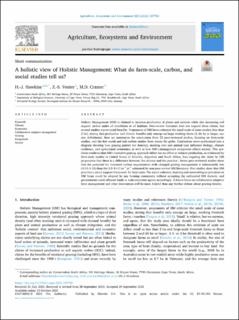A holistic view of Holistic Management: What do farm-scale, carbon, and social studies tell us?
Peer reviewed, Journal article
Published version

Åpne
Permanent lenke
https://hdl.handle.net/11250/3044300Utgivelsesdato
2022Metadata
Vis full innførselSamlinger
- Publikasjoner fra CRIStin - NINA [2364]
- Scientific publications [1392]
Originalversjon
10.1016/j.agee.2021.107702Sammendrag
Holistic Management (HM) is claimed to increase production of plants and animals while also increasing soil organic carbon under all conditions in all habitats. Peer-review literature does not support these claims, but several studies report social benefits. Proponents of HM have criticized the small-scale of some studies (less than 2 ha), stating that production and climate benefits only emerge on large working farms (2–66 ha or larger, our size definitions). Here we summarize the conclusions from 22 peer-reviewed studies, focusing on farm-scale studies, and the few social and soil carbon studies from across the globe. Conclusions were synthesized into a diagram showing how grazing pattern (or density), stocking rate and animal type influence biology, climate resilience, and agricultural economics, as well as how HM’s management component affects society. This synthesis confirms that HM’s intensive grazing approach either has no effect or reduces production, as evidenced by farm-scale studies in United States of America, Argentina and South Africa, thus negating the claim by HM proponents that there is a difference between ‘the science and the practice’. Seven peer-reviewed studies show that the potential for increased carbon sequestration with changed grazing management is substantially less (0.13–0.32) than the 2.5–9 t C ha-1 yr-1 estimated by non-peer-review HM literature. Five studies show that HM provides a social support framework for land users. The social cohesion, learning and networking so prevalent on HM farms could be adopted by any farming community without accepting the unfounded HM rhetoric, and governments could allocate funds to train extension agents accordingly. A future focus on collaborative adaptive farm management and other innovations will be more helpful than any further debate about grazing density. Climate Economics Collaborative adaptive management Grazing Rangelands Society
